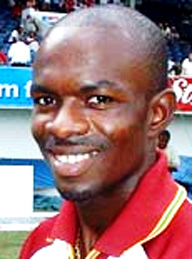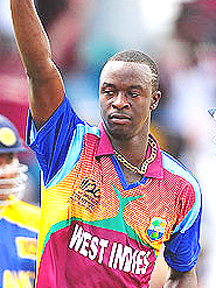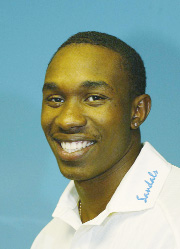By Tony Cozier
At the ICC World Cup
In DHAKA
There were always three teams in their group the West Indies needed to beat to be sure of advancing to the quarter-finals of the World Cup.

They despatched one, the Netherlands, more convincingly than even they themselves could have imagined at the Feroz Shah Kotla Stadium in Delhi on Monday night.
The Dutchmen, an assortment of amateur club cricketers mixed with four little known professionals and eleven of the squad of 15 born overseas, had given fancied England such a fright in their opening match that the West Indies seemed in for a testing time.
As it was, they overwhelmed them by 215 runs, as emphatic a margin possible within the limitations of the 50 overs an innings format. The Hindustan Times headline yesterday cleverly termed it “orange squash”, a reference to the Netherlands national sporting colour.

The West Indies confront the second, and most serious, challenge tomorrow night against one of the tournament hosts, Bangladesh, on their home patch in front of 35,000 passionate, raucous supporters at the Shere Bangla Stadium in the Dhaka suburb of Mirpur.
Perennial whipping boys of world cricket since their premature elevation to full status by the International Cricket Conference (ICC) in 2001, Bangladesh leapfrogged the West Indies one lowly spot in the ODI rankings, from No.10 to No.9, following their 4-0 sweep of New Zealand in a home series last year.
The confidence gained from that and the certain home support make them far more of a threat than the Dutch realistically were.
The West Indies complete their decisive sequence a week later in the northern Indian city of Mohali against Ireland, the highest ranked of the four associate teams in the tournbament.

Win all three matches and they are all but certain to move into the knockout quarter-final stage, whatever happens in their last two group encounters against England on March 17 and home team India three days later, both in Chennai.
They have been buoyed by Monday’s outcome even given the standard of the opposition, another ICC associate.
More than the result itself and the manner of it, there were heartened by several timely individual performances.
The two most significant were Kieron Pollard’s explosive 60 off 27 balls with the kind of hitting that has made him million dollar property in the Indian Premier League (IPL) and Kemar Roach’s demolition at start and finish that included the World Cup’s sixth hat-trick.

This is an important tournament for Pollard. He needs to show that his phenomenal power is as suited to the longer game as it is to the shortest. His first ball dismissal by Dale Steyn in the opening match reinforced the doubts. In that match, he was wasted at No.8 in the order. On Monday, he took the injured Dwayne Bravo’s place at No.6 and exposed the ordinary Dutch bowling for what it was.
Two of his four sixes were massive hits, carrying over 90 metres.
Tougher tests lies ahead but he has it in him to be the necessary middle order enforcer, whatever the state of the innings.
Roach likewise capitalised on the weakness of the Dutch batting. While he won’t find the Bangladeshis as compliant in their own conditions, on Monday he honed in on the correct length and the direct line necessary for fast bowling success on pitches in these parts so dead they might have been laid with soil from Westbury/Laperouse/Georgetown (use as relevant) cemetery.

It is a requiement quickly appreciated here by Steyn and long since by outstanding sub-continental fast men of whom the Sri Lankan slinger, Lalith Malinga, is the latest.
He followed Roach’s hat-trick with one of his own against Kenya in Colombo yesterday, simply obliterating the Africans with an incredible succession of toe-seeking yorkers.
Before Pollard, Chris Gayle, Devon Smith and Ramnaresh Sarwan all had productive time in the middle. Of the batsmen, only Shivnarine Chanderpaul, tactically held back to No.8, missed out. Gayle, without a significant score since his 333 in the first Test against Sri Lanka in Galle last November, clearly set himself for a lengthy session. He uncharactertically spent 22 balls over his first five runs but gradually found the middle of the bat with a succession of familiar drives until, with 80 off 110 balls, he hoisted the second ball of the batting power play into long-off’s lap.

Sarwan, out for 2 in the heavy opening loss to South Africa, helped himself to 49 off 42 balls without being at his best and Smith followed his 30 against South Africa with 53. The only let-down was that none compiled the hundred that was there for the taking.
Even so, it was a gratifying rehearsal for tomorrow’s real thing.









